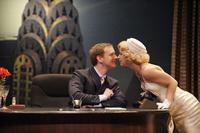By Randy Ray

Photo by David Cooper
The Shaw Festival is staging the play The President by famous Hungarian playwright Ferenc Molnár. It’s a fast-paced comedy that sees the clock start ticking for a powerful bank president when the young heiress under his care announces her secret marriage to a Communist taxi driver.
The President will be presented from June 7 to Oct. 4.
Playwright and novelist Molnár was born in Budapest on Jan. 12, 1878. As a child, he was interested the theatre and once described his first dramatic effort as “a weird, spectacular play which was successfully produced in the early [18]90s, on a flimsy stage built within the basement home of a friend. I did the settings, while my chum contributed the paper puppets of his own making. The premiere of this play, staged with the aid of all sorts of blue bottles filched from the surgery of my father, a physician, ended in a riot. In consequence of which, my next play had to languish for a decade thereafter, until the Comedy Theatre of Budapest saw fit to present it. This protracted pause may have left its baneful impress upon all my later dramatic efforts.”
At the age of 18, Molnár began work as a journalist. He also dabbled in short fiction and, by the age of 22, had published his first novel, The Hungry City (1900). He achieved some fame in 1907 with the publication of another novel, The Paul Street Boys, which depicted two rival “gangs” of kids on the streets of Budapest.
That same year, he established himself as one of the leading dramatists of his day with the production of The Devil, a reimagining of the Faust legend that dealt with a couple’s marital infidelity. His other plays include Liliom (1909) which was the basis for the Rodgers and Hammerstein musical Carousel, The Guardsman (1910) which was adapted into a film of the same name, The Swan (1920) also adapted into a film which was Grace Kelly’s last movie, and The Play’s the Thing (1926) which is reminiscent of Pirandello in its exploration of the themes of reality and illusion.
In total, Molnár wrote about 40 plays, which are known for their sophisticated dialogue, sentimental pathos, and unique fusion of realism and romanticism.
Molnár served as a war correspondent during World War I, and some of his accounts were published in the New York Times. During the late 1930s, it is said that he would sometimes sit in his favorite chair at a Budapest coffeehouse and converse with friends for hours. After the Nazis invaded nearby Austria, a friend asked Molnár (a Jew) why he didn’t emigrate to America to save himself.
“It is easy to emigrate to America,” Molnár reportedly replied, “but it is difficult to get up from this chair.” Eventually, Molnar did emigrate to the United States during World War II to escape Nazi persecution. He died in New York City on April 1, 1952.
During the first regular season of the National Arts Centre in Ottawa, Molnár’s The Guardsman was presented at the NAC by the Shaw Festival Company.
For more information about the upcoming presentation of The President, visit: www.shawfest.com
